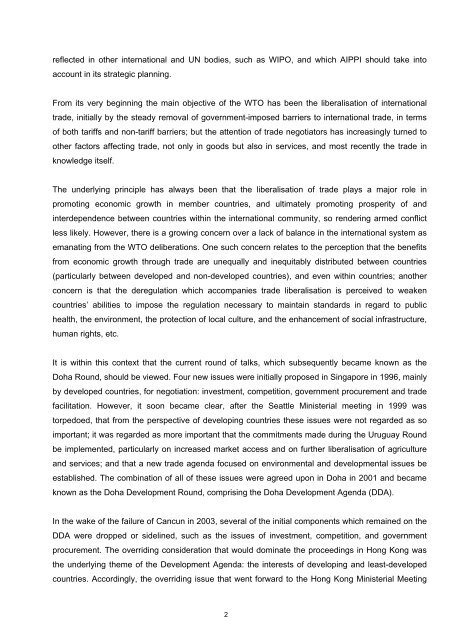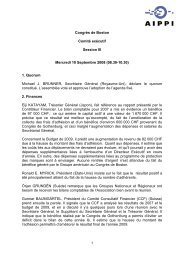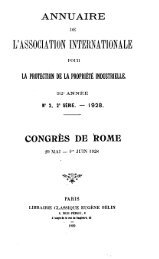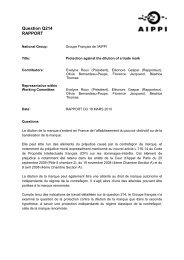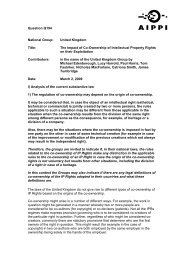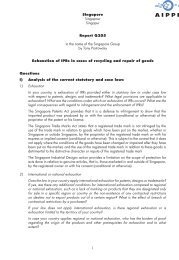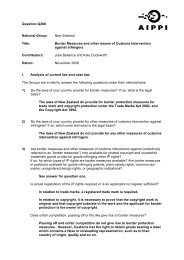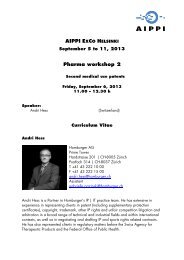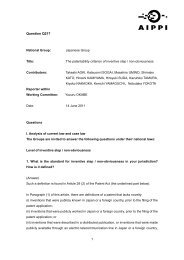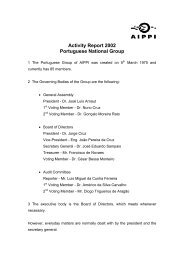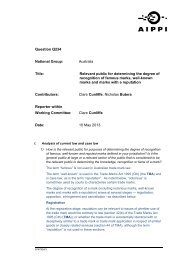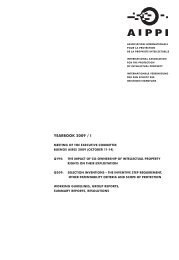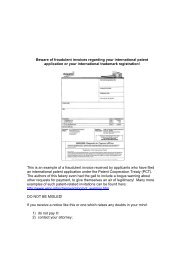Report on the 6th Ministerial Conference of WTO - AIPPI
Report on the 6th Ministerial Conference of WTO - AIPPI
Report on the 6th Ministerial Conference of WTO - AIPPI
You also want an ePaper? Increase the reach of your titles
YUMPU automatically turns print PDFs into web optimized ePapers that Google loves.
eflected in o<strong>the</strong>r internati<strong>on</strong>al and UN bodies, such as WIPO, and which <strong>AIPPI</strong> should take into<br />
account in its strategic planning.<br />
From its very beginning <strong>the</strong> main objective <strong>of</strong> <strong>the</strong> <strong>WTO</strong> has been <strong>the</strong> liberalisati<strong>on</strong> <strong>of</strong> internati<strong>on</strong>al<br />
trade, initially by <strong>the</strong> steady removal <strong>of</strong> government-imposed barriers to internati<strong>on</strong>al trade, in terms<br />
<strong>of</strong> both tariffs and n<strong>on</strong>-tariff barriers; but <strong>the</strong> attenti<strong>on</strong> <strong>of</strong> trade negotiators has increasingly turned to<br />
o<strong>the</strong>r factors affecting trade, not <strong>on</strong>ly in goods but also in services, and most recently <strong>the</strong> trade in<br />
knowledge itself.<br />
The underlying principle has always been that <strong>the</strong> liberalisati<strong>on</strong> <strong>of</strong> trade plays a major role in<br />
promoting ec<strong>on</strong>omic growth in member countries, and ultimately promoting prosperity <strong>of</strong> and<br />
interdependence between countries within <strong>the</strong> internati<strong>on</strong>al community, so rendering armed c<strong>on</strong>flict<br />
less likely. However, <strong>the</strong>re is a growing c<strong>on</strong>cern over a lack <strong>of</strong> balance in <strong>the</strong> internati<strong>on</strong>al system as<br />
emanating from <strong>the</strong> <strong>WTO</strong> deliberati<strong>on</strong>s. One such c<strong>on</strong>cern relates to <strong>the</strong> percepti<strong>on</strong> that <strong>the</strong> benefits<br />
from ec<strong>on</strong>omic growth through trade are unequally and inequitably distributed between countries<br />
(particularly between developed and n<strong>on</strong>-developed countries), and even within countries; ano<strong>the</strong>r<br />
c<strong>on</strong>cern is that <strong>the</strong> deregulati<strong>on</strong> which accompanies trade liberalisati<strong>on</strong> is perceived to weaken<br />
countries’ abilities to impose <strong>the</strong> regulati<strong>on</strong> necessary to maintain standards in regard to public<br />
health, <strong>the</strong> envir<strong>on</strong>ment, <strong>the</strong> protecti<strong>on</strong> <strong>of</strong> local culture, and <strong>the</strong> enhancement <strong>of</strong> social infrastructure,<br />
human rights, etc.<br />
It is within this c<strong>on</strong>text that <strong>the</strong> current round <strong>of</strong> talks, which subsequently became known as <strong>the</strong><br />
Doha Round, should be viewed. Four new issues were initially proposed in Singapore in 1996, mainly<br />
by developed countries, for negotiati<strong>on</strong>: investment, competiti<strong>on</strong>, government procurement and trade<br />
facilitati<strong>on</strong>. However, it so<strong>on</strong> became clear, after <strong>the</strong> Seattle <strong>Ministerial</strong> meeting in 1999 was<br />
torpedoed, that from <strong>the</strong> perspective <strong>of</strong> developing countries <strong>the</strong>se issues were not regarded as so<br />
important; it was regarded as more important that <strong>the</strong> commitments made during <strong>the</strong> Uruguay Round<br />
be implemented, particularly <strong>on</strong> increased market access and <strong>on</strong> fur<strong>the</strong>r liberalisati<strong>on</strong> <strong>of</strong> agriculture<br />
and services; and that a new trade agenda focused <strong>on</strong> envir<strong>on</strong>mental and developmental issues be<br />
established. The combinati<strong>on</strong> <strong>of</strong> all <strong>of</strong> <strong>the</strong>se issues were agreed up<strong>on</strong> in Doha in 2001 and became<br />
known as <strong>the</strong> Doha Development Round, comprising <strong>the</strong> Doha Development Agenda (DDA).<br />
In <strong>the</strong> wake <strong>of</strong> <strong>the</strong> failure <strong>of</strong> Cancun in 2003, several <strong>of</strong> <strong>the</strong> initial comp<strong>on</strong>ents which remained <strong>on</strong> <strong>the</strong><br />
DDA were dropped or sidelined, such as <strong>the</strong> issues <strong>of</strong> investment, competiti<strong>on</strong>, and government<br />
procurement. The overriding c<strong>on</strong>siderati<strong>on</strong> that would dominate <strong>the</strong> proceedings in H<strong>on</strong>g K<strong>on</strong>g was<br />
<strong>the</strong> underlying <strong>the</strong>me <strong>of</strong> <strong>the</strong> Development Agenda: <strong>the</strong> interests <strong>of</strong> developing and least-developed<br />
countries. Accordingly, <strong>the</strong> overriding issue that went forward to <strong>the</strong> H<strong>on</strong>g K<strong>on</strong>g <strong>Ministerial</strong> Meeting<br />
2


